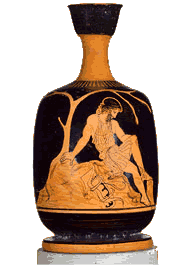Aristotle's Definition of Tragedy
 |
παθήματα / tragic acts
|
It is clear here that Aristotle understands the word "pathos" to mean violent acts that either occur during the play, have occurred before it started, or are threatened. |
 |
|
|
Contemporary social critics occasionally lament the frequency with which violence appears in our drama. It is interesting to note, however, that acts of violence or threatened acts of violence are actually written into this astute observer's description of ancient Greek tragedy. While, as Aristotle observes, such acts rarely take place on stage, they are nonetheless considered essential to the making of a tragedy. It should also be acknowledged that even though tragic characters meet their demise offstage, their broken and dismembered bodies are occasionally brought on stage - as in the case of Hippolytus and Pentheus.


